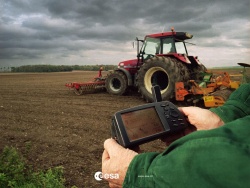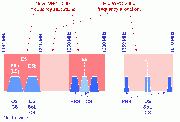If you wish to contribute or participate in the discussions about articles you are invited to contact the Editor
GALILEO Search and Rescue Service
| GALILEO | |
|---|---|
| Title | GALILEO Search and Rescue Service |
| Author(s) | GMV |
| Level | Basic |
| Year of Publication | 2011 |
GALILEO Support to Search and Rescue Service (SAR) represents the contribution of Europe to the international COSPAS-SARSAT co-operative effort on humanitarian Search and Rescue activities. Galileo is to play an important part of the Medium Earth Orbit Search and Rescue system (MEOSAR). Galileo satellites will be able to pick up signals from emergency beacons carried on ships, planes or persons and ultimately send these back to national rescue centres. From this, a rescue centre can know the precise location of an accident. At least one Galileo satellite will be in view of any point on Earth so near real-time distress alert is possible. In some cases, feedback could be sent back to a beacon, something which is only made possible by Galileo.[1]
The COSPAR-SARSAT Mission
The International COSPAS-SARSAT Programme provides accurate, timely, and reliable distress alert and location data to help search and rescue authorities assist persons in distress. The objective of the Cospas-Sarsat system is to reduce, as far as possible, delays in the provision of distress alerts to Search and Rescue (SAR) services, and the time required to locate a distress and provide assistance, which have a direct impact on the probability of survival of the person in distress at sea or on land..[3]
Purpose
The Commercial Service (CS) is aimed at market applications requiring higher performance than offered by the Open Service. It provides added value services on payment of a fee. Galileo CS used combination of two encrypted signals for higher data throughput rate and higher accuracy authenticated data.
The foreseen applications will be based on: [4]
- Dissemination of data with a rate of 500 bps, for added value services;
- Broadcasting of two signals, separated in frequency from the Open Services signals in differential applications to facilitate advanced applications such as integration of Galileo positioning applications with wireless communications networks, high accuracy positioning and indoor navigation.
These will be developed by service providers, which will buy the right to use the two commercial signals from the Galileo operator.
Developing commercial applications either by using the commercial signals alone, or by combining them with other Galileo signals or external communications systems, opens a wide range of possibilities. The worldwide coverage brings a strong advantage for applications requiring global data broadcast. The Commercial Service does not offer integrity information.[1]
Performance and features
The Galileo Commercial Service is based on adding two signals to the Open access signals. This pair of signals is protected through commercial encryption, which is managed by the service providers and the future Galileo operator. Access is controlled at the receiver level, using access-protection keys.
The Galileo Operating Company (GOC) will determine the level of performance it can offer for each commercial service together with ascertaining the demands of Industry and the needs of the consumer. It is intended to provide a guarantee for this service. The Commercial Service will be a controlled access service operated by Commercial Service Providers acting after a license agreement between them and the GOC. Commercial service providers will make decisions on the offered services: e.g. integrity data, differential corrections for local areas, etc… which will depend on the final characteristics of the other services offered by Galileo. [4]
To know more information about Performances of each Galileo Service see the article Galileo Performances.
Implementation and Applications
The Galileo Commercial Service signals will be the Open Services Signals, plus two encrypted signals (ranging codes and data), on the “E6” band. The implementation of this Service is not planned for the Initial Operational Capability (IOC) phase.[2]
Typical value-added services include service guarantees, precise timing services, the provision of ionosphere delay models, local differential correction signals for extreme-precision position determination and other services based on the broadcast of system information data.


